Items
topic_interest is exactly
elderly
-
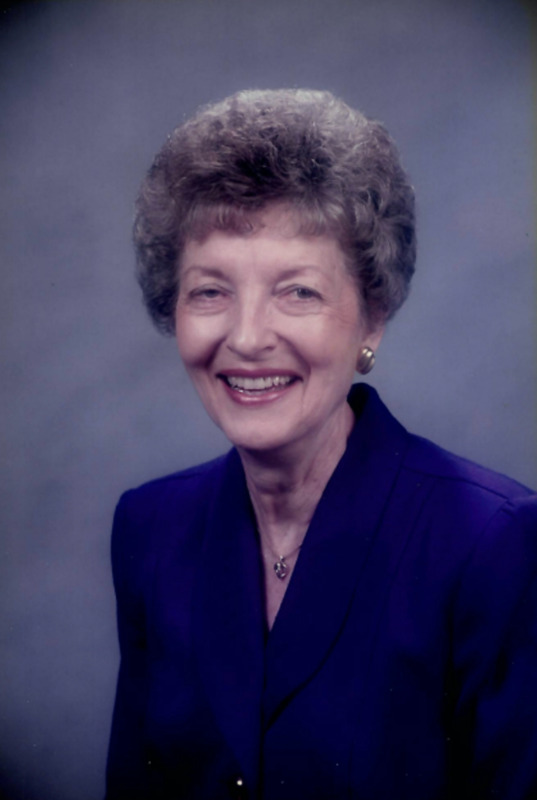 2022-07-02
2022-07-02Taking Care of My Grandma During COVID
This is a story of taking care of my grandma during COVID. A lot of the time I was employed as a caretaker for my grandma overlapped with the height of COVID. -
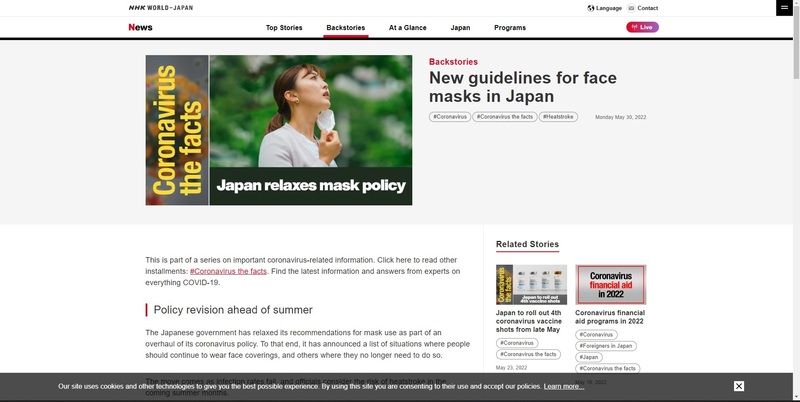 2022-05-30
2022-05-30New guidelines for face masks in Japan
Japan, as of May 30th, 2022, is relaxing the face mask guidelines. For the most part, masks do not need to be worn outdoors except when the elderly are in close quarters to other people. Indoors, masks are still required indoors except in the case of when someone is in little to no conversation, which the article shows in a chart. The chart's example states walking around museums and libraries where there is little to no conversation. One of the reasons for why Japan is relaxing face masks is because summer is approaching and the temperature will rise. There are fears about face masks causing heatstroke. In Japan, temperatures can range from 70-90 degrees F, but the summers are hot and humid too. So, it makes sense to relax the restrictions, especially in the outdoors. -
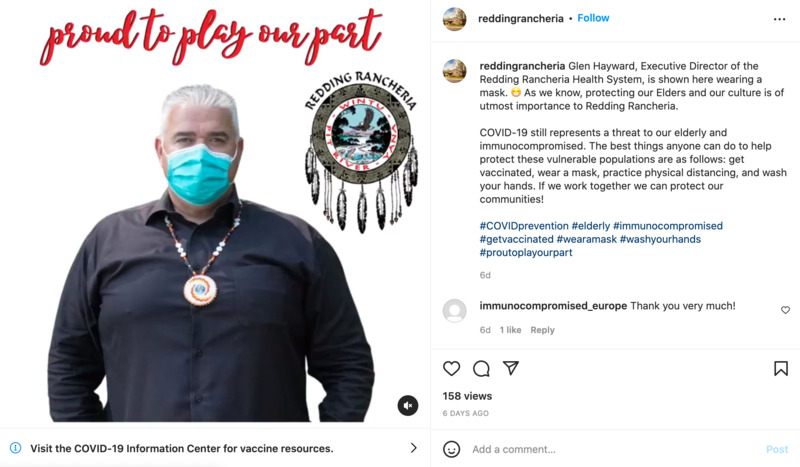 2022-05-22
2022-05-22Proud to play our part
This is an Instagram post by reddingrancheria. This is an advertisement for wearing a mask to protect the elderly. Seeing as elderly are more at risk for dying of COVID, I can understand why elderly would wear masks more often themselves, in addition to their caretakers wearing masks frequently. -
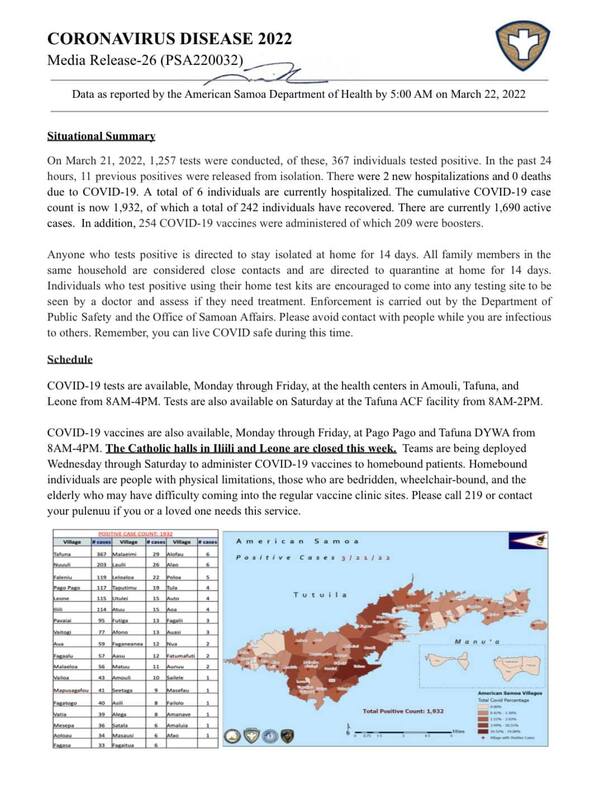 2022-03-22
2022-03-22American Samoa COVID Cases Situational Report #16
This is the sixteenth report released by the American Samoa Department of Public Health regarding the rise of covid cases in American Samoa. As of March 22, 2022, positive cases have risen to 1932 from 1565 on March 21, 2022. -
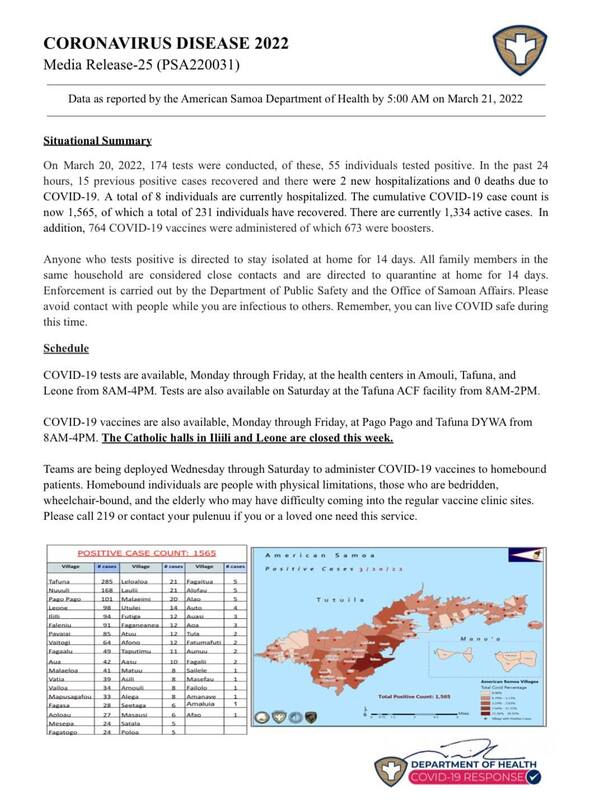 2022-03-21
2022-03-21American Samoa COVID Cases Situational Report #15
This is the fifteenth report released by the American Samoa Department of Public Health regarding the rise of covid cases in American Samoa. As of March 21, 2022, positive cases have risen to 1565 from 1188 on March 17, 2022. -
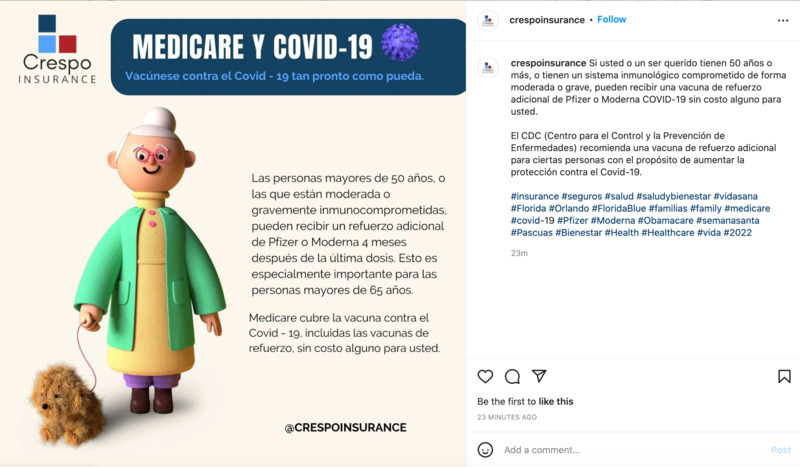 2022-04-11
2022-04-11Medicare Y COVID-19
This is an Instagram post by crespoinsurance. This is a post written in Spanish giving advice to elderly on vaccines. It advises people fifty and older, and those that are immunocompromised to get vaccinated. It also says that Medicare covers COVID vaccines. -
2020-03
Grandma and COVID-19
During the height of the pandemic in 2020, my family and I were super concerned about keeping the older members of our family safe. Keeping our 80+ year-old grandma safe was a challenge since she was under the impression that she was tougher than the virus, a mindset that seems to be shared across a lot of the elderly community. We tried not to visit her during the first couple months of the lockdowns, but eventually we went over to her house with masks on and stayed 6 feet apart. The pandemic created a difficult dilemma in which people wanted to keep their older loved ones safe, so they stayed away, but at the same time, the elderly were incredibly lonely as they had relied on family visits for stimulation and company. Now my entire family is vaccinated, so we can safely visit our grandmother, but the fear still lingers. -
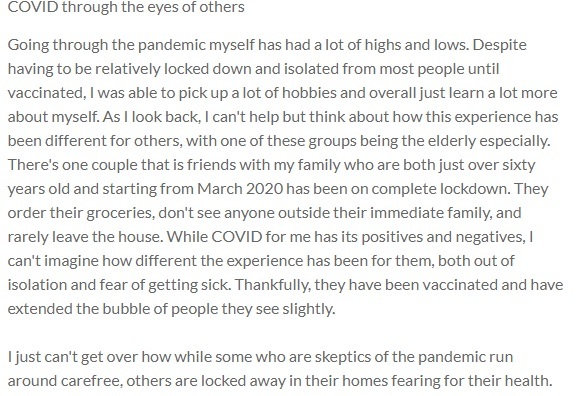 2020-03-01
2020-03-01COVID through the eyes of others
Going through the pandemic myself has had a lot of highs and lows. Despite having to be relatively locked down and isolated from most people until vaccinated, I was able to pick up a lot of hobbies and overall just learn a lot more about myself. As I look back, I can't help but think about how this experience has been different for others, with one of these groups being the elderly especially. There's one couple that is friends with my family who are both just over sixty years old and starting from March 2020 has been on complete lockdown. They order their groceries, don't see anyone outside their immediate family, and rarely leave the house. While COVID for me has its positives and negatives, I can't imagine how different the experience has been for them, both out of isolation and fear of getting sick. Thankfully, they have been vaccinated and have extended the bubble of people they see slightly. I just can't get over how while some who are skeptics of the pandemic run around carefree, others are locked away in their homes fearing for their health. -
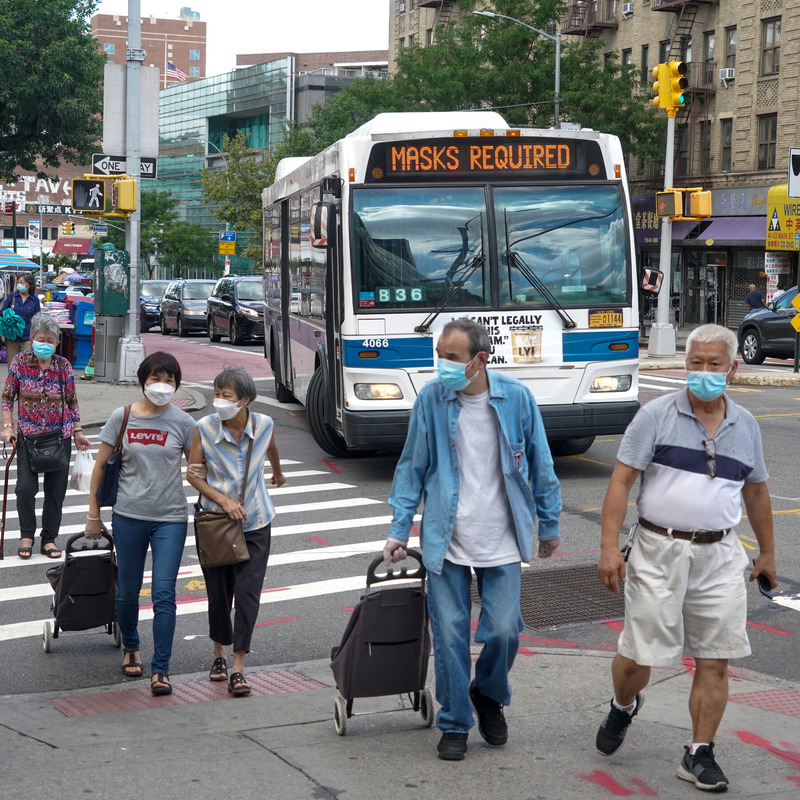 2020-08-03
2020-08-03The Pandemic that Changed It All
I think we all should take this as an experience to be prepare for the next major event. -
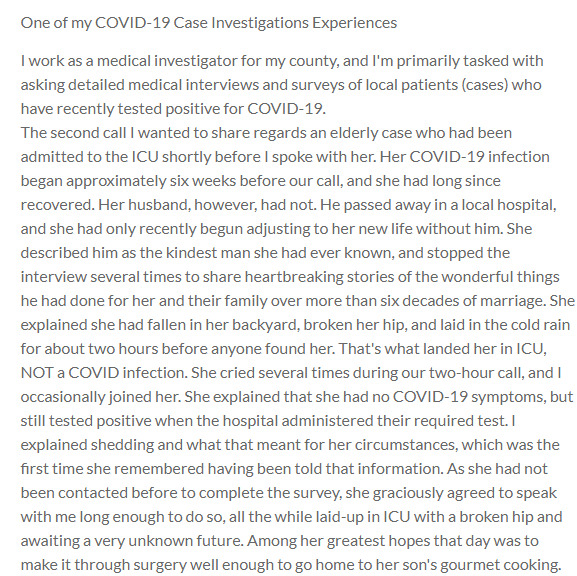 2021-02-15
2021-02-15One of my COVID-19 Case Investigations Experiences
I work as a medical investigator for my county, and I'm primarily tasked with asking detailed medical interviews and surveys of local patients (cases) who have recently tested positive for COVID-19. The second call I wanted to share regards an elderly case who had been admitted to the ICU shortly before I spoke with her. Her COVID-19 infection began approximately six weeks before our call, and she had long since recovered. Her husband, however, had not. He passed away in a local hospital, and she had only recently begun adjusting to her new life without him. She described him as the kindest man she had ever known, and stopped the interview several times to share heartbreaking stories of the wonderful things he had done for her and their family over more than six decades of marriage. She explained she had fallen in her backyard, broken her hip, and laid in the cold rain for about two hours before anyone found her. That's what landed her in ICU, NOT a COVID infection. She cried several times during our two-hour call, and I occasionally joined her. She explained that she had no COVID-19 symptoms, but still tested positive when the hospital administered their required test. I explained shedding and what that meant for her circumstances, which was the first time she remembered having been told that information. As she had not been contacted before to complete the survey, she graciously agreed to speak with me long enough to do so, all the while laid-up in ICU with a broken hip and awaiting a very unknown future. Among her greatest hopes that day was to make it through surgery well enough to go home to her son's gourmet cooking. She hadn't seen anyone but medical staff since her admit as the hospital disallowed visitors at that time. After we disconnected, I sent a Get Well gift to her hospital. She spoke several times of her Christian faith and belief in her husband's salvation, so I had a carved wood angel sent to her room from the hospital gift shop. We never spoke again, but I hope she understands how much she helped me that day by letting me help her in some small way. -
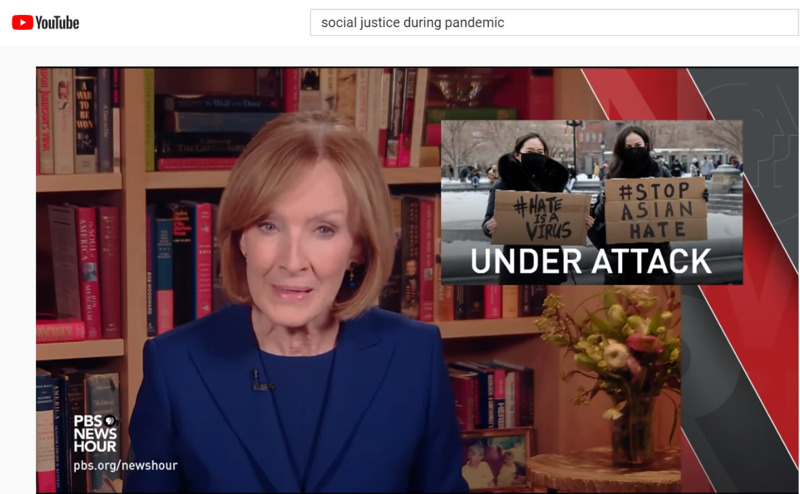 2021-03-16
2021-03-16Surge in Hate Crimes Against Asian Americans
As the U.S. continues its battle against COVID-19, it is also battling a rise in hate crimes against Asian Americans. A recent report found that hate crimes against Asian Americans in major U.S. cities surged by nearly 150 percent in 2020 —even as the number of overall hate crimes fell. Stephanie Sy looks at how the violence has marred one community, and how they are coming together in its wake. -
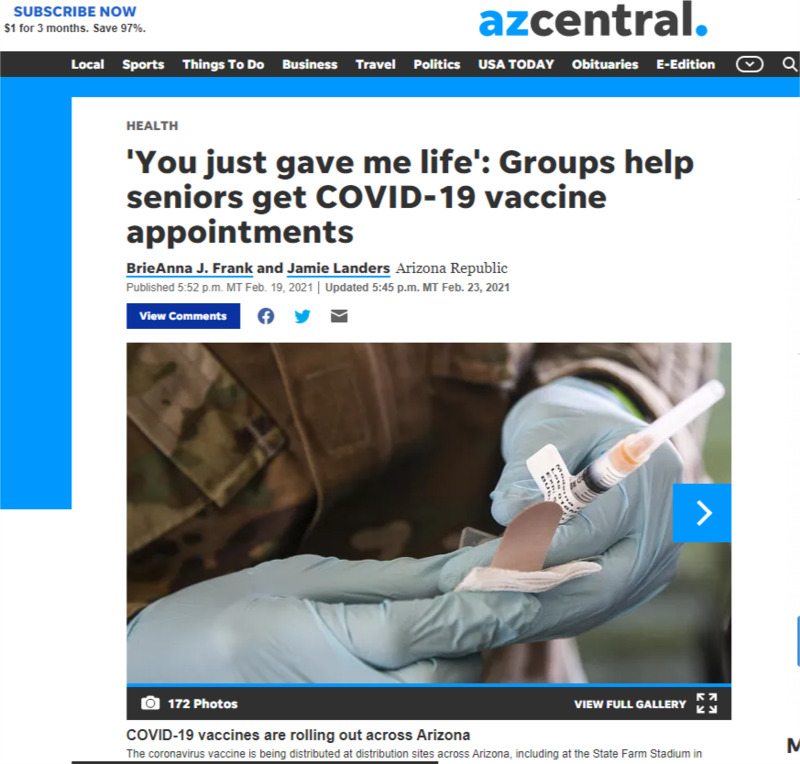 2021-02-19
2021-02-19'You just gave me life': Groups help seniors get COVID-19 vaccine appointments
The elderly of Arizona are having difficulty sign-up for a COVID-19 vaccine. Issues with the state website and difficulty accessing technology seem to be the main causes. The ADHS is working on making the website more functional and is using an appointment hotline to combat the issue. Local groups are also assisting the elderly with making appointments. -
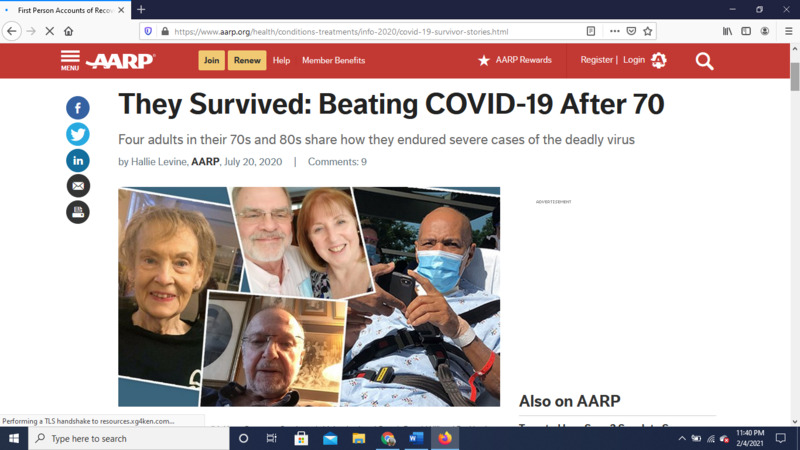 2020-07-20
2020-07-20They Survived: Beating COVID-19 After 70
When Covid-19 cases began making the news in America, the stories were centered around nursing homes, where the population seemed especially susceptible. Day after day more reports of Covid-19 infecting and killing numerous patients and residents within these facilities painted a dire picture. And it is still dire. However, there are individuals who, despite their advanced age, survived Covid-19. This article from the AARP highlights four individuals in their 70s and 80s who suffered through serious cases involving long hospital stays and ventilators that made it through this virus. An interesting aspect of this article is every person interviewed ends their section by chastising people going out to restaurants, bars, and not wearing masks. Though they survived, they used this platform to try and convey the severity of the situation. As an 80-year-old female survivor from New York stated “This is not the flu. This is something that wants to kill you. It saps your strength and makes you feel like you prefer to die. This disease is such an unknown quantity. I cannot understand why anyone would refuse to wear a mask. It's a pandemic!” Hopefully, people reading survivor stories such as these will make people reflect on the choices, they are making for themselves and their communities. -
2021-01-31
Volunteering Breaks Hearts
I volunteered at one of the County’s vaccination clinics last week. The health department ramped up their vaccination schedule, and we saw nearly 50% more traffic than the week prior, which was already 30% above its projections. Many of the folks over 65 (group 1C) here in Tucson are going up to Phoenix to be vaccinated as local health officials are still working their way through the 75+ crowd (Group 1B1). It has been both heartbreaking and frustrating that about a third of the vehicle occupants beg and plead for some special exemption for a family member who’s with them. Despite not yet being entitled to be vaccinated themselves, they hope someone lets them cut in line. Everyone has a special need and a special, unique circumstance that should enable them to jump ahead of their neighbors, and the selfishness of it agitates one of my few prejudices, especially when they don't take the initial 'no' for an answer. The public is so terrified, and many seem to fear they won’t manage to avoid illness in the coming weeks despite having done so for ten months now. It hurts my heart to see their suffering, to hear their fear and anxiety, to have to turn them away, and to know they’re asking for special treatment that might deny the delivery of vaccines to the most vulnerable populations. The hardest part has been, though, the number of elderly folks entitled to be vaccinated who can't navigate the online portal to get an appointment. The current vaccines are stored so cold that we can't deviate from the allotted appointments, but every day brings in elderly people who can't function in a digital world. The county can't spare personnel to offer immediate and realistic registration help to them, and many have complained of waiting on the phone for hours, only to have the county phone line hang up on them. The situation makes me want to find their grandchildren and ask why they don't give a damn about helping their grandparents. I also found out last night our organization's portion of the operation is winding down, and I do not expect to again be able to help facilitate vaccinations in my community. With time and eventual immunization, I hope to find other ways to serve my neighbors. -
2021-01-31
Suffering and Loss
I work as an investigations contractor assigned to assist my county health department with interviewing positive covid-19 patients. I recently spoke with an 85-year-old C19 patient who was hospitalized and awaiting surgery for a brain bleed at the time of our conversation. She explained that she had fallen in her backyard trying to retrieve her feral cat's bed from a rainstorm, tripped, and laid in the rain for almost two hours before anyone found her. Both she and her late husband contracted covid-19 around Christmas, and he died soon thereafter. The hospital where he received his final treatments allowed her to visit him just before he passed, which is an unusual and gracious blessing at this time. The medical interview that normally takes 30 minutes required almost two hours and tears from both of us. When we finished, I wished her well, offered that I looked forward to speaking with her soon, and asked God to bless her. I called her hospital gift shop and ordered a carved wooden angel to be delivered to her room, as she’s a woman of faith. I had the card signed from me and the Health Dept, so I suppose I’ll find out this week if anyone complained about it. More than anything else, I’m hoping her file shows a successful discharge and recovery by now. She told me she looked forward to trading in the cafeteria food for her son's gourmet cooking, and I pray she's already done that. -
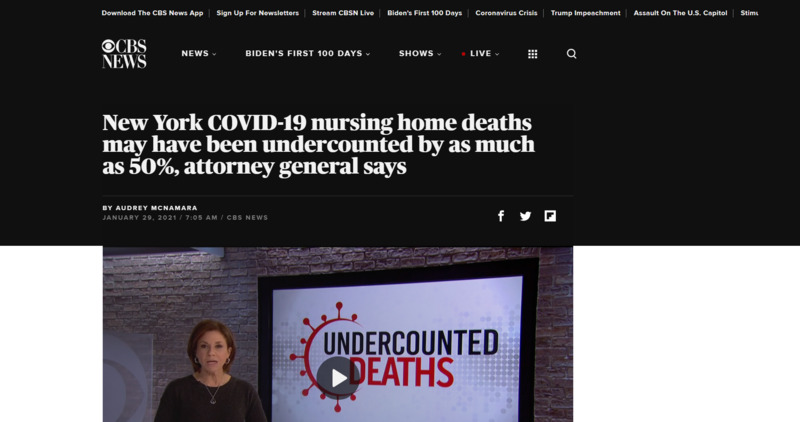 2021-01-29
2021-01-29New York COVID-19 nursing home deaths may have been undercounted by as much as 50%, attorney general says
The New York Attorney General says that the official number of COVID-19 deaths in nursing homes maybe 50% below the actual number. However, the state's Health Commissioner disputes this claim saying that death statistics are determined by the location of death. Therefore, any nursing home resident that dies in the hospital is counted as a hospital death instead of a nursing home death. There has also been an investigation launched against several nursing homes that are sided to have violated COVID-19 protocols. -
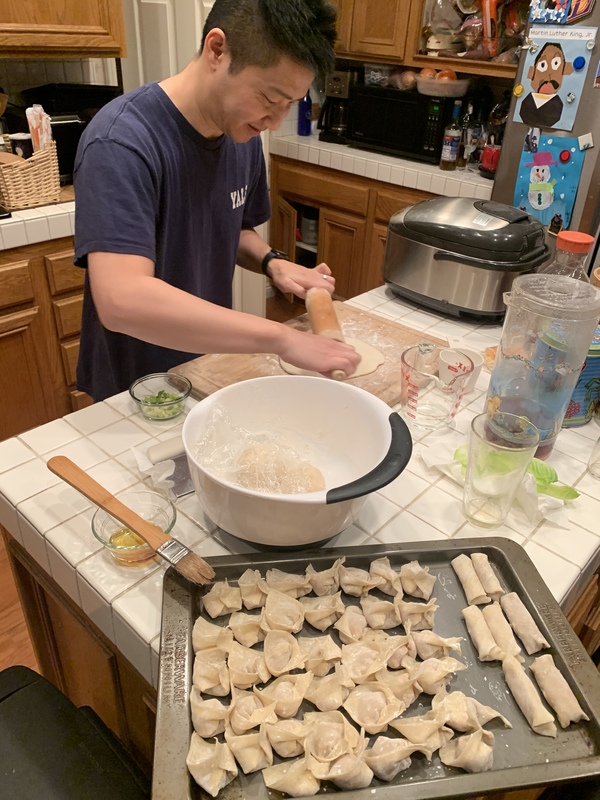 2021-01-18
2021-01-18Filling the Void with Food...and Failing
Food is the centerpiece of all of our family gatherings, even the informal ones. Before quarantine, my in-laws would drop by regularly, and always with enough food for an army. In the almost twenty years I have known my mother in law, I have never seen her without being given food - even if it’s a fresh bao she pulls out of her purse (true story - this happened at my kids’ student of first trimester awards last year (pre-Covid). I saw her for a total of 20 minutes, just enough time to watch my son and daughter get their awards and dash back to work, and that saint of a woman gave me three warm bao she had picked up on the way from a local bakery. “Pretty good” she said, which is her seal of approval.) It is hard to admit as I type this that I have not physically seen my in-laws beyond waving through the front window when they drop off homemade jook (rice porridge) since March. We Facetime with them and text, but it is not the same. That is a long time to be away from people that have a house less than five miles from ours. My in-laws are over 70 and a huge part of our lives, to lose this year with them hurts in ways I can’t describe. And culturally, food is their “I love you” - they don’t say the words, they show it through sharing food. And we haven’t had a meal together in almost a year. My husband still cooks Chinese dishes. On Monday, we had 蔥 油 餅 (green onion pancake), dumplings, Hong Kong waffle, shrimp with peas and lumpia (yes, I know, that’s really Filipino, but it’s sort of a staple in our family), and it was delicious. But there is this odd shadow that sort of hangs over our meal, knowing how much his parents would have loved to share it with us. And yes, we Facetimed them so the kids could show them how well the waffle turned and my mother-in-law said she couldn’t wait to come over and try it. The feeling is very, very mutual. -
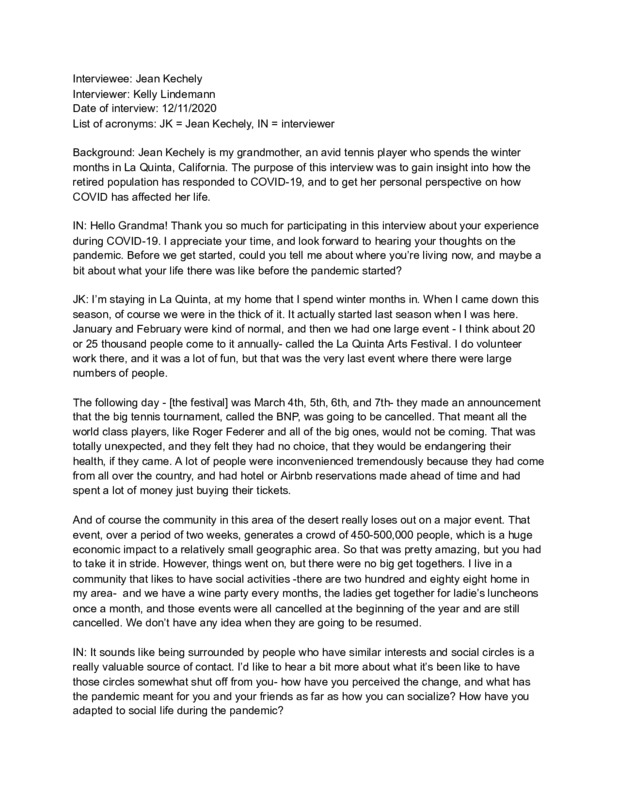 2020-12-11
2020-12-11Interview with Jean Kechely
Interviewee: Jean Kechely Interviewer: Kelly Lindemann Date of interview: 12/11/2020 List of acronyms: JK = Jean Kechely, IN = interviewer Background: Jean Kechely is my grandmother, an avid tennis player who spends the winter months in La Quinta, California. The purpose of this interview was to gain insight into how the retired population has responded to COVID-19, and to get her personal perspective on how COVID has affected her life. IN: Hello Grandma! Thank you so much for participating in this interview about your experience during COVID-19. I appreciate your time, and look forward to hearing your thoughts on the pandemic. Before we get started, could you tell me about where you’re living now, and maybe a bit about what your life there was like before the pandemic started? JK: I’m staying in La Quinta, at my home that I spend winter months in. When I came down this season, of course we were in the thick of it. It actually started last season when I was here. January and February were kind of normal, and then we had one large event - I think about 20 or 25 thousand people come to it annually- called the La Quinta Arts Festival. I do volunteer work there, and it was a lot of fun, but that was the very last event where there were large numbers of people. The following day - [the festival] was March 4th, 5th, 6th, and 7th- they made an announcement that the big tennis tournament, called the BNP, was going to be cancelled. That meant all the world class players, like Roger Federer and all of the big ones, would not be coming. That was totally unexpected, and they felt they had no choice, that they would be endangering their health, if they came. A lot of people were inconvenienced tremendously because they had come from all over the country, and had hotel or Airbnb reservations made ahead of time and had spent a lot of money just buying their tickets. And of course the community in this area of the desert really loses out on a major event. That event, over a period of two weeks, generates a crowd of 450-500,000 people, which is a huge economic impact to a relatively small geographic area. So that was pretty amazing, but you had to take it in stride. However, things went on, but there were no big get togethers. I live in a community that likes to have social activities -there are two hundred and eighty eight home in my area- and we have a wine party every months, the ladies get together for ladie’s luncheons once a month, and those events were all cancelled at the beginning of the year and are still cancelled. We don’t have any idea when they are going to be resumed. IN: It sounds like being surrounded by people who have similar interests and social circles is a really valuable source of contact. I’d like to hear a bit more about what it’s been like to have those circles somewhat shut off from you- how have you perceived the change, and what has the pandemic meant for you and your friends as far as how you can socialize? How have you adapted to social life during the pandemic? JK: Well actually, I would have to tell you that I feel very minimally impacted due to being a retired person and in excellent help, which enables me to engage in the normal activities that I enjoy, which I would describe as healthful recreation. I still play tennis three times a week, and my tennis club had to make a couple of changes. They require all of us members to wear a mask when we enter the property, but once we’re on the court and actually playing then we can remove our masks. Another big change was that we could not invite any guests to the club; that was something that we all enjoyed doing, but they felt that they couldn’t allow that. So, that’s how it still is right now. IN: As far as your companions in the club, are you all fairly like minded in your reactions, or are there differences in people’s opinion on how to respond to the virus? JK: Oh, there are many, many differences. Some people feel that they just don’t know what to believe about it. They don’t know what advice to follow, so anything that is actually mandated by the government, then we have to follow that to be good citizens. Several of the women with whom I play would have an adult child tell them “Well Mom, I don’t think you should be playing any longer because you have no control over where those people are going, or with whom they’re associating”. So, I’ve had a couple of players that I know stop playing, though now they’re back. There are a lot of people from Canada who are members of my tennis club. As soon as this started happening, I’d say around February, they left quickly to return to Canada because they were afraid that the borders would be closed down. This year almose none of them have come back, and the composition of our membership is greatly reduced and very changed. There is one Canadian couple who did fly down, quarantined for two weeks and had their car shipped down, which they’d never done before. Around here, a lot of the women are middle aged, fifty or older, and I am considerably older. Some of them didn’t even feel comfortable visiting each other’s homes, but some were so bored and needed socialization since they couldn’t do their regular activities that they were willing to go to somebody else’s house here in the neighborhood. I have a couple of friends who come over once a week to play Rummikub or Scrabble. One of my good friends has been volunteering for eleven years as an usher for the McCallum Theatre. They get top entertainment for very short runs, maybe only a weekend or an evening, but they have top entertainers like Rhonda Fleming, for example. She is dreadfully missing the wonderful entertainment that she got to see, and misses the people with whom she used to work as an usher. There’s still no idea of when they will be able to resume, since entertainment contracts like those are created at least a year ahead of time. That’s been a big loss for her to not have that. She’s someone who comes over and plays Rummikub or Scrabble with me. IN: It seems quite valuable to have a close circle of friends that you can get together with. Our social lives are very important and have a significant impact on our mental health. JK: And especially as you get older, they say that socialization is very important to help maintain your psychological health. I feel very fortunate that I can do this, and am very happy that there are some women in the area willing to go out and go to somebody else’s house. But I know there are a few who still don’t feel comfortable leaving their own homes, and it must be very difficult to them. IN: I’m interested in your perspective on the relative levels of safety and comfort that people have around protecting themselves from the virus. From what I’ve heard, the virus is more dangerous to people who are immunocompromised or older. I’ve seen a few submissions to the Journal of the Plague Year that center around older people who have a lot of apprehension of the virus, and many of them have taken drastic measures to protect themselves. As someone who is older, do you consider yourself to be vulnerable to COVID, and what is your attitude towards the virus? JK: Well age-wise of course I am vulnerable, but fortunately I do not have any underlying immune problems and am grateful for having such good health. I realize how difficult this pandemic has been for so many American families- parents are trying to keep an income stream, many of them have school-aged children at home and have to supervise their schoolwork, and try to keep the family engaged in outdoor activities. It’s almost too much to expect of a great many families, especially when it’s gone on since February or March and accompanied by harsh lockdown measures. A lot of people that I talk to are not certain that the advice they were given at the beginning [of the pandemic] has been accurate. They feel that a lot of the advice handed down by government bodies has been inaccurate. But you can’t blame them, since this is the first time such a thing has happened in our lifetimes, and everybody is having to go carefully and listen to what is advised. If you are a responsible person you listen to the advice, since these are the people who are in the NHI and the CDC and we should listen to what they think is best. A lot of people say, “We’ve been misled and don’t know what to believe”. I think with the mask thing there’s been a lot of resistance, and of course when you have your president so often appearing in public without his mask, that sends a poor message. I think that wearing a mask is a very small thing to ask of a person, whether it’s going to help other people or yourself- it’s such an easy thing and we should all be willing to do it. IN: I think so too, and on that note would like to bring up how the virus has been politicized, especially as it’s occurred during an election year, and how our governmental bodies have taken strategic stances on it. If you recall, back in March there were conflicting news articles about the subject of wearing a mask- some of then claimed that wearing one would increase your chances of getting it, or make it harder for medical workers to get the masks they needed. There was so much conflicting advice in the news, and I think that really impacted people’s perception of the virus and made it much harder to for them to know how to respond. Living in a community where people are from different areas and backgrounds must have given you an interesting view into the different ways that people perceive the virus. JK: I do hope that we can have this vaccine soon, but even with that there are many people who say that they won’t get the vaccine until its proven to be safe and effective. And I do understand that, but am glad that it will be made available first to healthcare workers and elderly people in nursing homes. IN: On that topic, some of the stories coming from nursing homes are heartbreaking, especially since they’ve had to be strict about limiting visitors. Living in isolation is hard for anyone, but living in a community away from your friends and family must make it a level of magnitude more difficult. JK: Oh yes. I have one of my friends whose husband is- was- in an Alzheimer’s care facility, and she would visit him every Tuesday and Thursday for over a year. When COVID-19 hit, the facility would not allow any visitors, even family. That was very hard for her, but they were able to arrange telephone and Zoom visits so she could actually see him. He passed away before I was abel to come down for the season, and I was very, very saddened for her. IN: The amount of suffering that people have had to endure is astonishing, and I hope that having a record of people’s experiences during the pandemic can help us to remember what people went through and maybe help us do better in the future. I sincerely appreciate that you’ve participated in this interview to share with the Journal of the Plague Year, and thank you so much for having this conversation with me. -
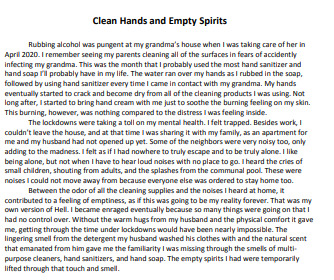 2020-12-09T17:33
2020-12-09T17:33First Year of Marriage and the Pandemic
I got married on May 11, 2019. There were no masks and no need to distance from each other. In July 2019, I got my first job working for my grandma as her caretaker. Since I had graduated ASU, I didn't have much going on, and I needed some way to occupy myself, as well as make money. I did things such as picking the oranges that would fall from the trees in her backyard and trash them so the area would look nicer. I cooked, I cleaned, and I assisted her in computer tasks that she didn't understand how to do. In December of 2019, my grandma had a few unfortunate things happen to her. First, she got pneumonia and had to be taken to the emergency room. She survived, but was weak. Later on, she ended up falling, and was then taken to a care center so that she could regain her strength and do physical therapy. When my grandma came back from the care center in January, I had a new job. Learning from what the physical therapist taught me, I used the exercise recommendations for her and helped her walk better again. It was no easy task, as my grandma can be quite stubborn, but luckily, she was willing to take direction from me in order to move around easier. We have been doing the physical therapy as part of her daily routine ever since. Due to my grandma's worsening condition, my mom and dad decided to move to my grandma's house in January, leaving the apartment mostly to me and my husband. This change was greatly welcomed, and it felt like we could experience married life without my family intervening nearly as much. Overall, January was a pretty good month for me and my husband. One of the biggest events that happened to me before the virus was the death of one of my cousins. On February 11, 2020, he commit suicide. It was a jarring experience. He had lived nearby with his wife and kid and helped install new electrical outlets in the apartment me and my husband were sharing with my parents until a new apartment opened in that same complex. Despite this, we were able to have a normal funeral, which was nice since it gave me some closure. I mostly felt bad for his wife and kid he left behind, since they would now have to figure out how to continue without him. By the time February hit, I was well aware of the virus by this time, but I was sure that majority of the problem was in China. Earlier that month, I had gone to the Dominican Republic to do some volunteer work, as I knew how to speak Spanish. I noticed travel restrictions to and from China at that time, and thought that the travel restrictions could help. This is why I mostly thought the pandemic was mostly China's problem. This idea was quickly changed when March hit. When March 2020 hit and there was a declaration of national emergency, I was very stressed by it. I kept on having images flash in my head of empty grocery aisles that I've seen from social media. Due to the panic that had occurred over the national emergency declaration, the grocery store in my area was completely out of eggs, toilet paper, and hand sanitizer, and the meat aisle was nearly emptied. There were rations on the amount of canned goods you could get. Me and my husband were able to grab a few, some of which my husband said were the "good ones that no one wanted". After that, my anxiety lessened and I felt like I could handle it. I was wrong, as I was not expecting full lockdowns later that month. By the time April came along, the lockdowns felt so severe to me that I couldn't escape anywhere. Bedsides my husband having to comfort me, one of the only things keeping me sane was the job of working for my grandma. I became even more thankful for that job since had I gotten a job in the service industry, or even a basic office job, I would have likely been let go due to being too new. Additionally, I was working full-time for a while, so money wasn't as much of an issue for me as it was before I had gotten the job. April was also when I had one of my worst anxiety attacks, and so to help me, my husband took me out to get some fast food and eat in a parking lot in order to not feel so enclosed. March felt similar to April. The big difference here though was that my brother had to come back from his LDS Church mission six months earlier due to the pandemic, so we ended up having someone new to live with when he got back. One of the nice things my family did, since church services were changed due to the virus, was having by brother bless the sacrament, as he had the authority to do so. By dressing for church and having it at my grandma's home, I was able to feel a bit more normal again, which helped me reduce my anxiety. When May hit, it was me and my husband's one year anniversary. For this special occasion, I booked an Italian restaurant and were able to dine-in for the first time in months. As more places started to open up, I felt my anxiety decrease, as I knew I could enjoy more things again. I am now writing this all in December 2020. The endless monotony of living without as many places to go has made this year feel like both the longest and shortest year that I have experienced. I know that things will change and things will go back to normal, and that is one of the things that is keeping me happy. My anxiety is the worst it has ever been this year due to the restrictions on everyday life, but I've learned that I can live through it, with the help of my husband. This was a trying year for many people's marriages, and to have this experience within the first year of marriage has made me realize how much I depend on my husband, but also that we can get through many tough things together. -
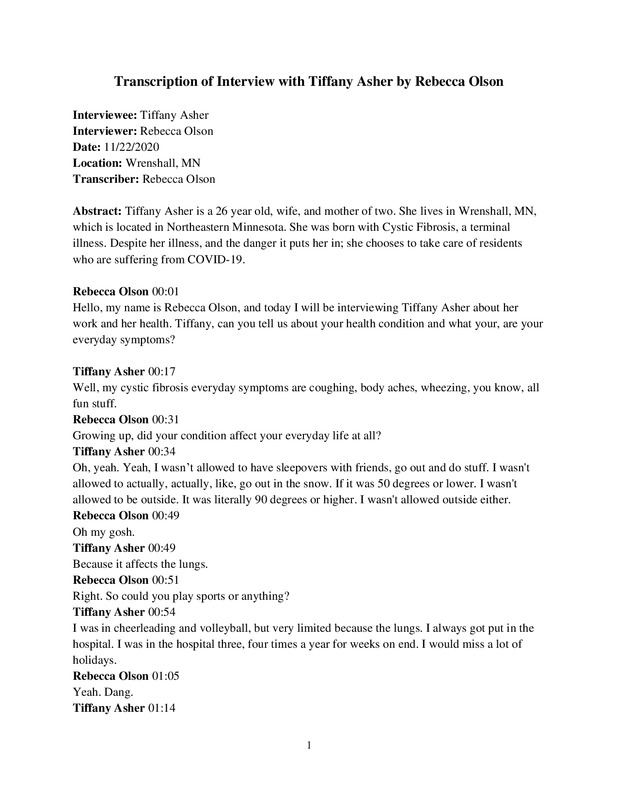 2020-11-22
2020-11-22Tiffany Asher Oral History, 2020/11/22
Tiffany Asher is a wife, mother, and she suffers from a terminal illness called cystic fibrosis. She chooses to care for elderly people suffering from COVID-19 against the wishes of her healthcare providers. -
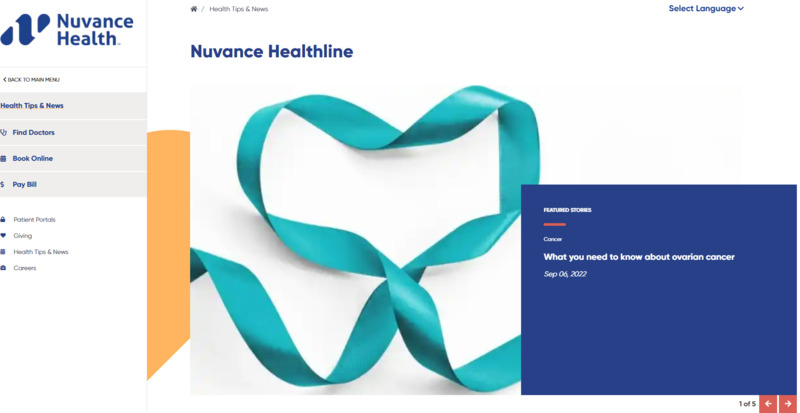 2020-11-23
2020-11-23High Risk Populations - The Story of David Nelson M. II
“This email is in regard to my grandfather's Covid diagnosis: My grandfather's name is David Nelson M. II. He was born June 1, 1936, so that means he's 84. It also means he is in the high-risk group. In January of this year [2020], he went on a cruise with a group of his friends and returned feeling ill. At first he wrote his illness off as the flu, but his "flu" lasted for months. Eventually, went to a clinic and discovered he had COVID-19, so his doctor ordered him to go to the emergency room on November 3rd. He was in the emergency room for five hours before the staff finally admitted him, spending the next seven days in the hospital. After a five-course treatment on IV, he was released and allowed to go home on November 10th.” The contributor of this story also reported that within two weeks following his grandfather's release from the hospital, his grandfather had a serious fall. Whether or not this fall can be contributed to any prolonged side effects of the virus has not yet been determined. There have been, however, documented cases of people experiencing cognitive fatigue, such as dizziness and, and other side effects related to cognition and the nervous system weeks and even months following their recovery form COVID-19. This is a phenomena warranting further research to determine what the possible long-lasting effects may be to people who have survived the illness, especially those at high risk such as the elderly and those suffering from a chronic disease. -
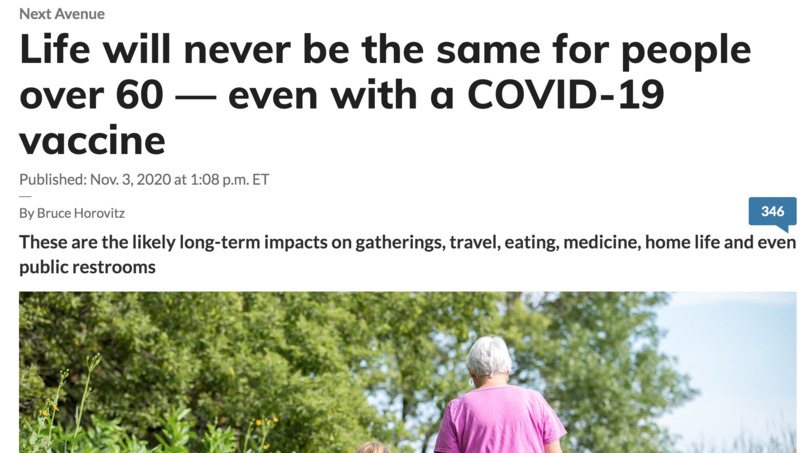 2020-11-03
2020-11-03Life Will Never Be The Same?
I chose this because it specifically talks about what life for people over 60 after COVID-19 could be like. Most of other items I have seen have been what life has been like during the pandemic. Telemedicine will become more popular or common for the elderly as it has been a common precaution used during the pandemic. Traveling will change in ways like more driving, buying three plane tickets for two people to help social distance and many more. Online ordering of food, groceries, and even common shopping trips will be done online or have online delivery. -
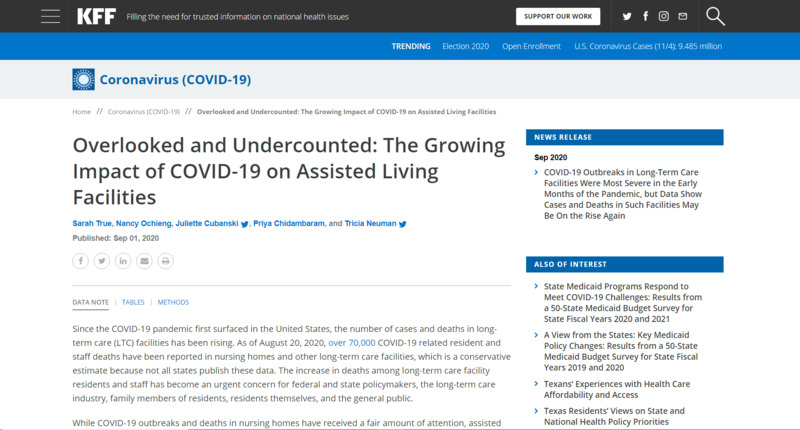 2020-09-01
2020-09-01Overlooked and Undercounted: The Growing Impact of COVID-19 on Assisted Living Facilities
While most states report the number of COVID-19 cases and deaths in nursing homes, the number of cases and deaths in assisted living facilities are usually either lumped together with nursing homes or ignored. This not only causes gaps in case data but also leads to the needs of assisted living facilities being ignored. -
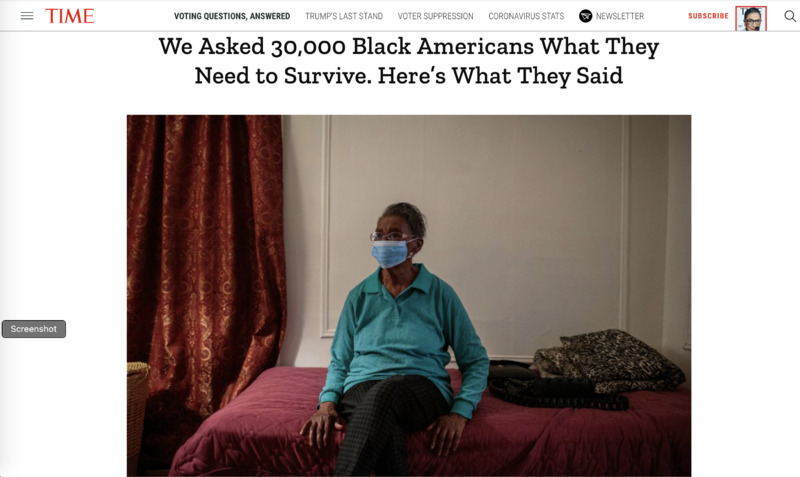 2020-05-01
2020-05-01What Black Americans Need To Survive the Pandemic
It’s an article discussing what elder Black Americans need to survive the pandemic. It provides crucial information on the inequalities between Blacks and Whites and how that inequality leads to more Blacks dying. -
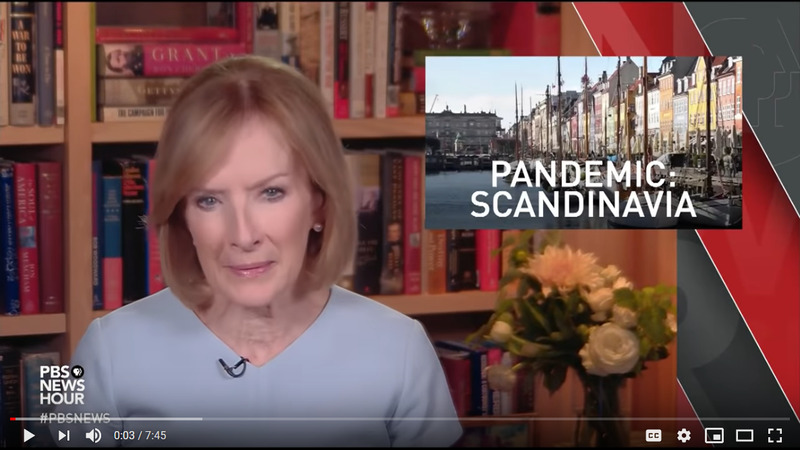 2020-09-08
2020-09-08Sweden Criticized for Poor Response to Elderly COVID-19 Patients
Malcolm Brabant reports that, “Over ninety percent of Sweden’s [Covid-19] fatalities were over the age of 70. Half were in nursing homes. Oxygen wasn’t provided.” Sweden has seen an improvement in infection rates lately, but the country’s treatment of the elderly in the early days of the pandemic has been widely criticized. Many feel that Sweden’s elderly were shunted aside. -
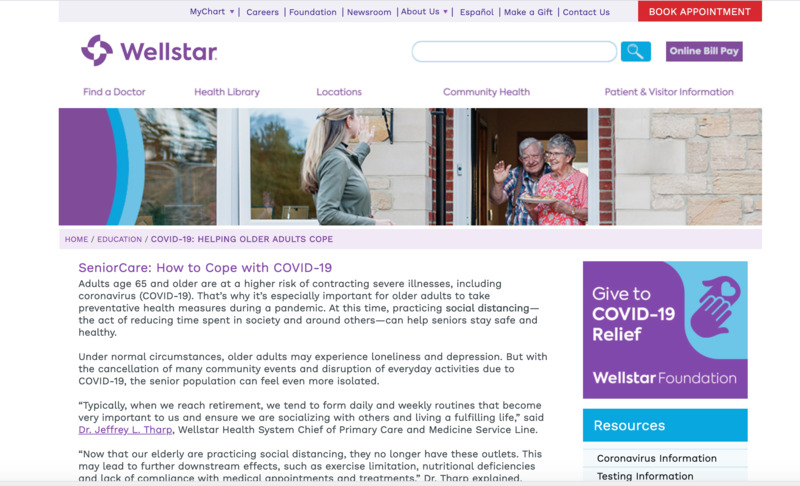 2020-10-28
2020-10-28How to Cope with COVID-19
Prior to COVID-19 older adults or the elderly were prone to depression and isolation and now with community events cancelled those are rising. The CDC suggests not watching news coverage, care about your health, relax, ask for support if you need it, and take action if need be. If you know someone who is elderly make a virtual visit, send physical mail, encourage them to care about their health, and always be a helping hand if you can be. -
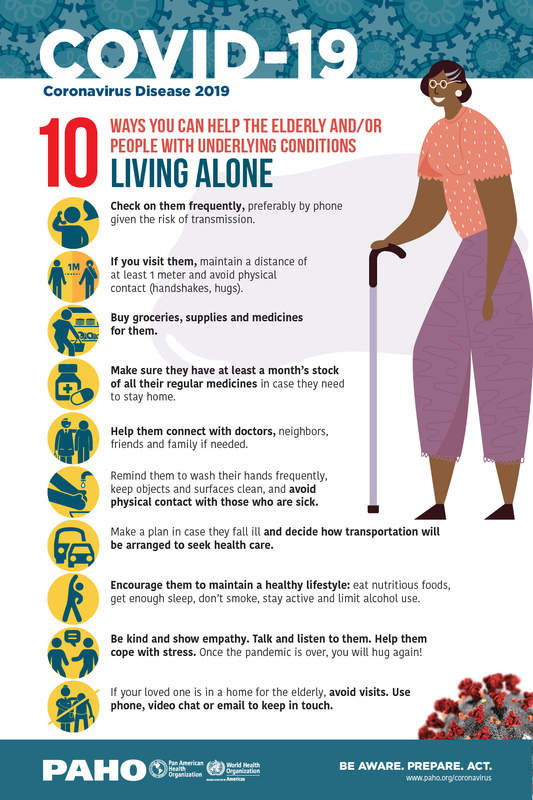 2020-04-07
2020-04-07COVID-19 Infographic for the Elderly
The image is an infographic that lists 10 ways for people to help the eldery during COVID-19. Such as checking on them frequently, visit them (social distanced of course), buy things they may need, and other ways you can easily show you care and can help. -
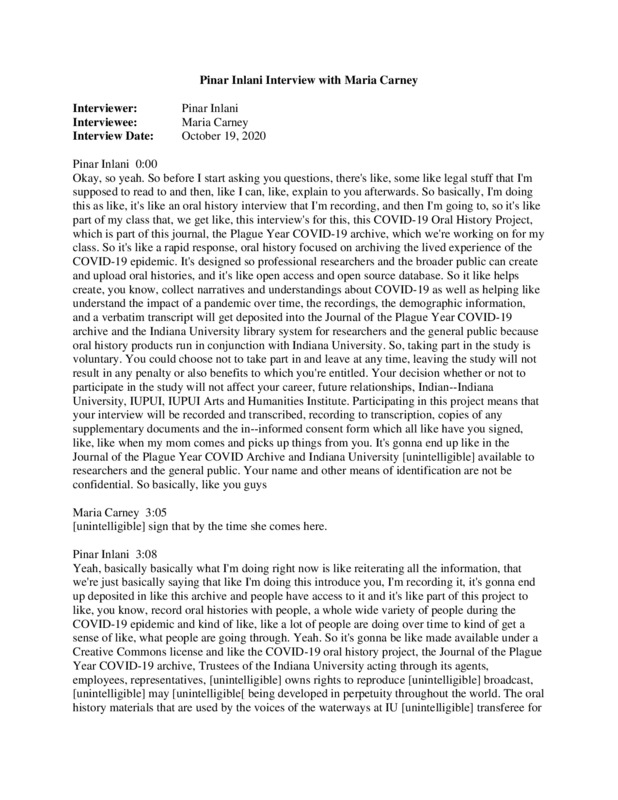 10/19/2020
10/19/2020Maria Carney Oral History, 2020/10/19
I interview my maternal (and only living) grandmother over the phone about her experience of Covid while primarily self-isolating in her mobile home. There is not so much direct question and answer but over the course of a somewhat rambling conversation pretty much all the topics get covered. Although she remains pretty spry for her age, there are some places where she loses the thread or misunderstands the conversation. -
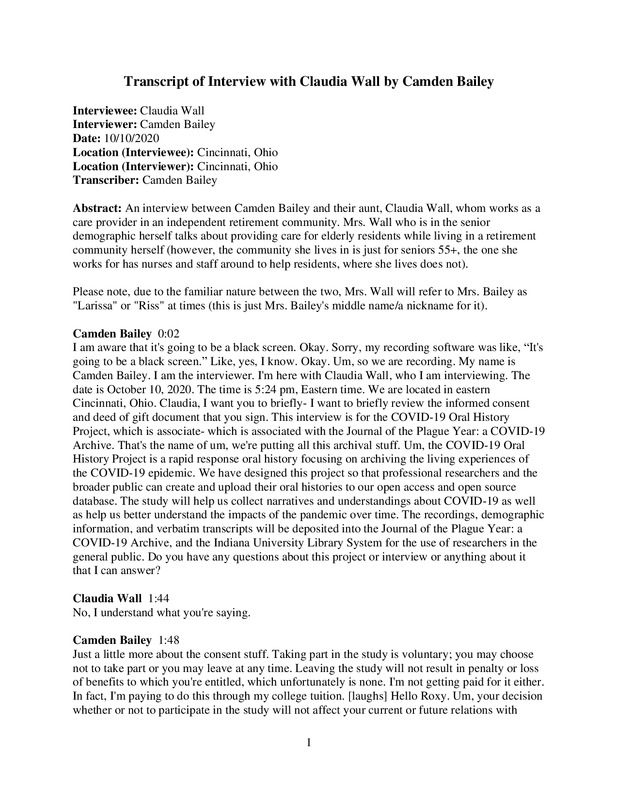 10/10/2020
10/10/2020Claudia Wall Oral History, 2020/10/10
An interview between Camden Bailey and their aunt, Claudia Wall, whom works as a care provider in an independent retirement community. Mrs. Wall who is in the senior demographic herself talks about providing care for elderly residents while living in a retirement community herself (however, the community she lives in is just for seniors 55+, the one she works for has nurses and staff around to help residents, where she lives does not). Please note, due to the familiar nature between the two, Mrs. Wall will refer to Mrs. Bailey as "Larissa" or "Riss" at times (this is just Mrs. Bailey's middle name/a nickname for it). -
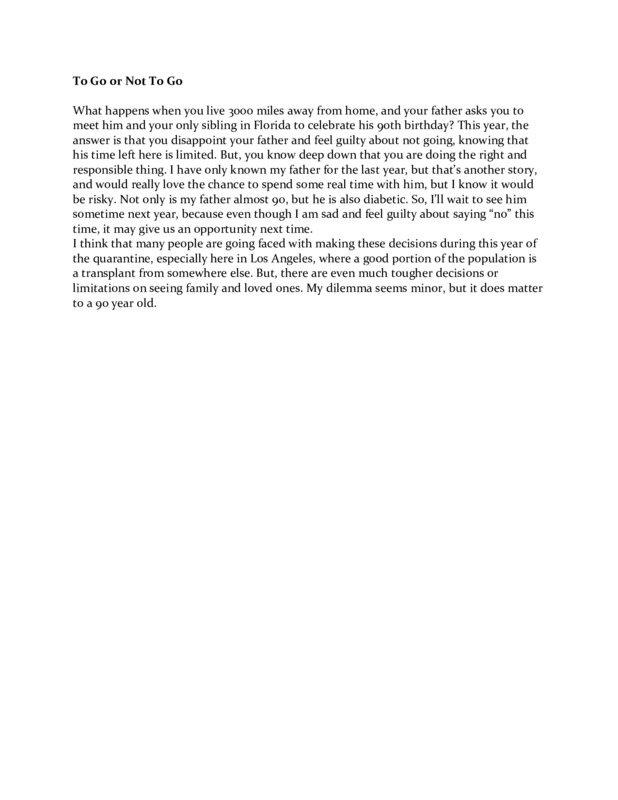 2020-10-16
2020-10-16To Go or Not To Go
What happens when you live 3000 miles away from home, and your father asks you to meet him and your only sibling in Florida to celebrate his 90th birthday? This year, the answer is that you disappoint your father and feel guilty about not going, knowing that his time left here is limited. But, you know deep down that you are doing the right and responsible thing. I have only known my father for the last year, but that’s another story, and would really love the chance to spend some real time with him, but I know it would be risky. Not only is my father almost 90, but he is also diabetic. So, I’ll wait to see him sometime next year, because even though I am sad and feel guilty about saying “no” this time, it may give us an opportunity next time. I think that many people are going faced with making these decisions during this year of the quarantine, especially here in Los Angeles, where a good portion of the population is a transplant from somewhere else. But, there are even much tougher decisions or limitations on seeing family and loved ones. My dilemma seems minor, but it does matter to a 90 year old. -
2020-09-10
keep our grandma safe
While some of my relatives live in Australia, most of my family is in Israel, which is doing really bad covid-wise. We keep in touch via a What'sApp family groupchat. However, over the last few weeks, the groupchat had become a site of conflict. We in Australia, on one hand, take the virus very seriously and have favourable attitudes towards lockdown and face masks. My relatives in Israel, on the other hand, see it as a prelude to dictatorship. They also subscribe to all sorts of covid conspiracy theories that undermine their faith in public action. Although usually their opinions are tolerated, covid has really fleshed out our ideological differences to an irreconcilable point. The other week, my cousin in Israel showed up to my grandmother’s house with her friends. This caused a backlash here in Australia among relatives who were concerned for my grandmother’s safety. After quite a public and vicious argument on the What’sApp groupchat my grandmother eventually stepped in to defuse the tensions. As absurd as it sounds, I hope my relatives stay away from my grandmother. Their alternative views, which were once endearing and funny, can now claim her life. Ultimately, I would be powerless to stop them from here. -
2020-09-10
keep our grandma safe
While some of my relatives live in Australia, most of my family is in Israel, which is doing really bad covid-wise. We keep in touch via a What'sApp family groupchat. However, over the last few weeks, the groupchat had become a site of conflict. We in Australia, on one hand, take the virus very seriously and have favourable attitudes towards lockdown and face masks. My relatives in Israel, on the other hand, see it as a prelude to dictatorship. They also subscribe to all sorts of covid conspiracy theories that undermine their faith in public action. Although usually their opinions are tolerated, covid has really flashed out our ideological differences to an irreconcilable point. The other week, my cousin in Israel showed up to my grandmother’s house with her friends. This caused a backlash here in Australia among relatives who were concerned for my grandmother’s safety. After quite a public and vicious argument on the What’sApp groupchat my grandmother eventually stepped in to defuse the tensions. As absurd as it sounds, I hope my relatives stay away from my grandmother. Their alternative views, which were once endearing and funny, can now claim her life. Ultimately, I would be powerless to stop them from here. -
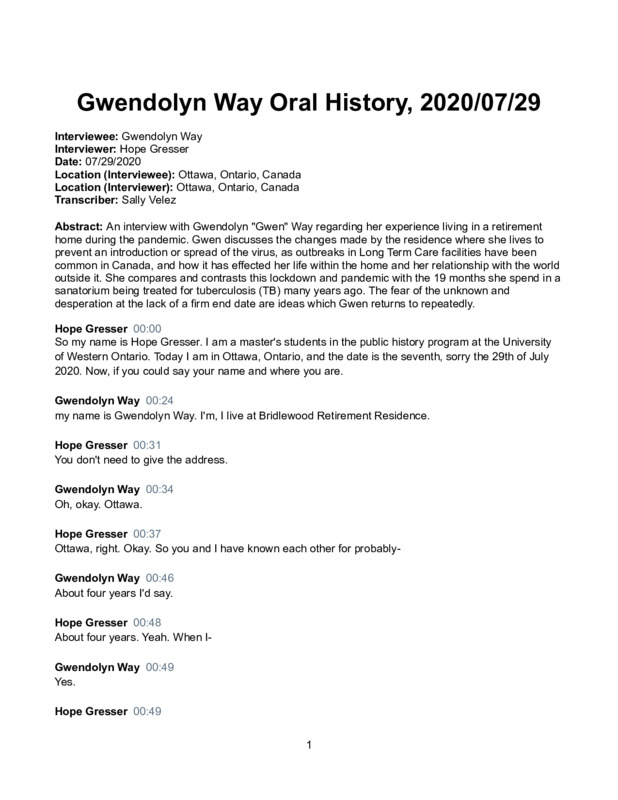 07/29/2020
07/29/2020Gwendolyn Way Oral History, 2020/07/29
An interview with Gwendolyn "Gwen" Way regarding her experience living in a retirement home during the pandemic. Gwen discusses the changes made by the residence where she lives to prevent an introduction or spread of the virus, as outbreaks in Long Term Care facilities have been common in Canada, and how it has effected her life within the home and her relationship with the world outside it. She compares and contrasts this lockdown and pandemic with the 19 months she spend in a sanatorium being treated for tuberculosis (TB) many years ago. The fear of the unknown and desperation at the lack of a firm end date are ideas which Gwen returns to repeatedly. -
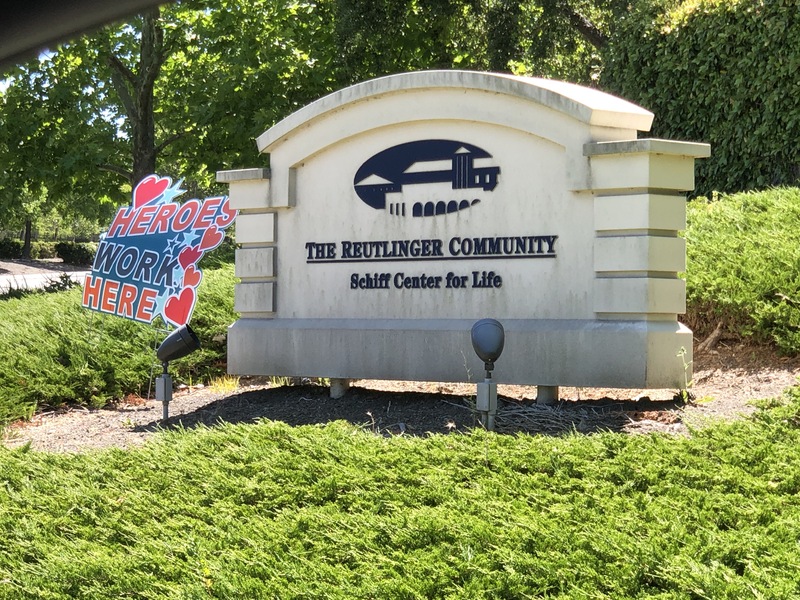 2020-06-29
2020-06-29Heroes Work Here
The Reutlinger is a senior living community, specializing in assisted living, memory care and skilled nursing, nearby my home. About a week into our shelter-in-place orders, this sign appeared near the main entrance to the facility. The sign reads "Heroes Work Here." Senior care facilities have been hit the hardest during the COVID-19 pandemic. When an outbreak of the virus occurs within these facilities, it spreads quickly and typically results in a large number of fatalities. Those working at the Reutlinger during this pandemic are working on the front lines and are heroes as they risk their safety to care for some of the most vulnerable members of our community. -
 2020-05-28
2020-05-28New Beginnings Church - Adapting Church Services Amid COVID-19
Sharon Annesley of Blanchard, Oklahoma tells the story of her rural church and how it adapted their services during COVID-19. Her text document story chronicles the ways they were affected and adapted to the pandemic. This includes transition to virtual church services and transitions back after Oklahoma's loosening of restrictions upon churches in May of 2020. The church eventually created separate services between two church locations to allow the elderly and high risk members to attend exclusively in a safer environment than the rest of the lower risk members. This text document is authored under the name "Sharon Annesley, Member of New Beginnings Church - Blanchard, Blanchard, Oklahoma." The story is titled under the heading "NEW BEGINNINGS CHURCH - ADAPTING CHURCH SERVICES AMID COVID-19" (May 28, 2020) The story features a photograph of the church. Sharon Annesley hand-submitted the physical copy of this document to Clinton P. Roberts, curatorial intern, for submission into the #ruralvoices collection. Contributed by Clinton P. Roberts, curatorial intern. -
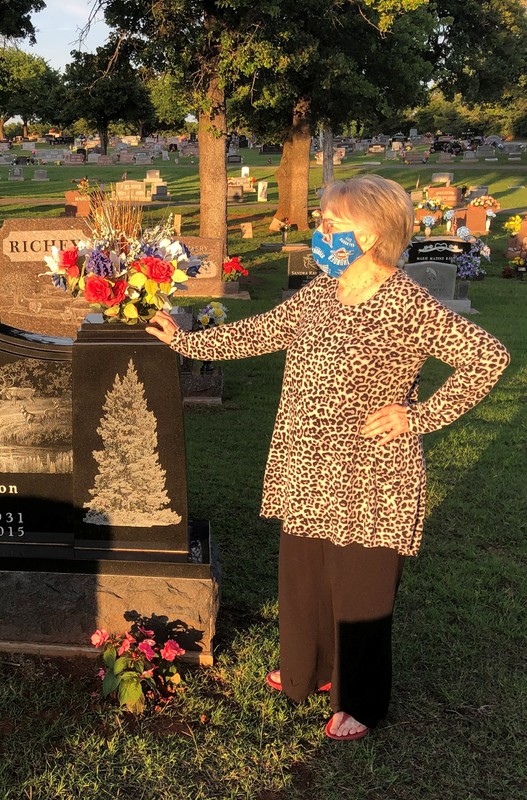 2020-05-26
2020-05-26Grandmother Grateful for Opportunity to Visit Husband's Grave for Memorial Day During COVID-19
Jo Ann of Blanchard, Oklahoma visited her husband's grave on 05/26/2020. She was taken by her grandson and his girlfriend to visit his grave. Before the restrictions of COVID-19 set in March, Jo Ann had visited her husband's grave almost daily for over five years. Since the restrictions of the pandemic, she had only visited three times. She said she was very grateful to be able to spend some time with her husband who had been a veteran in the Korean War. Jo Ann said she was looking forward to this pandemic ending so she could resume her normal visits. Submitted for the #ruralvoices collection. Contributed by Clinton P. Roberts, curatorial intern for Arizona State University, HST 580.
